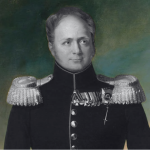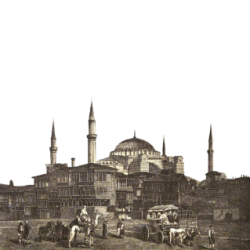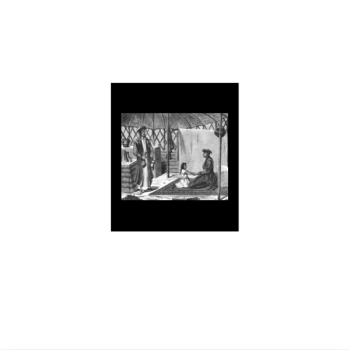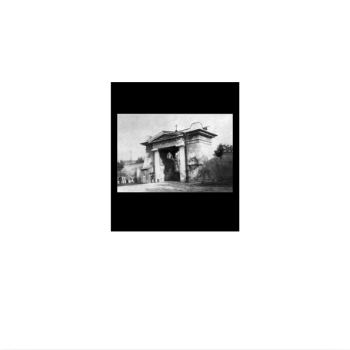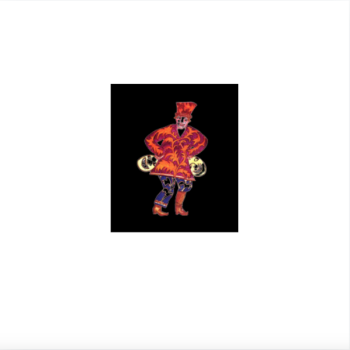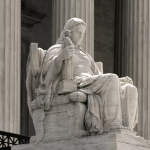THE DECEMBRISTS
Having seen the Tsar off, Andrei Mikhailovich returned to Ekaterinoslav and, having sent General Inzov a baton to report on all the details of the Tsar’s passage through the colony, he informed him of the Sovereign’s order to convey to him that he wished to speak with him upon returning to Taganrog. As a result of this, Inzov arrived in Ekaterinoslav from Chisinau in preparation for the Tsar’s arrival (which was expected in two weeks.) Taking Andrei Mikhailovich with him, Inzov set off on a slow tour of the colonies. Rumors of the Tsar’s ill health were now circulating. On November 23, while dining in the home of a man named Gozadinov, not far from the Greek village of Mariupol, Andrei Mikhailovich and Inzov learned that the Tsar had died after suffering from fever. The unexpected news deafened them like thunder. Inzov was distraught, not so much from grief as from fear. As a weak and suspicious man, he did not dare go further and stayed overnight with Gozadinov so he might have more time to think about what to do. He sent Andrei Mikhailovich to Taganrog ahead of him with a letter to General Diebitsch to find out his opinion on the course of events.

Prince Sergey Grigoryevich Volkonsky
Upon his arrival, Andrei Mikhailovich found everyone in mourning and despondency, with very gloomy faces. General Diebitsch did not tell him anything positive, no opinion, no advice, and remained at a loss as to what he should do. The very next day Inzov arrived, realizing that his arrival, in any case, could not be taken in a bad direction, and his two officials, Bier and Pritchenka, stayed in Andrei Mikhailovich’s apartment. Prince Sergey Grigoryevich Volkonsky and General Diebitsch were very pleased with the arrival of Inzov (as an assistant in their in their efforts) and invited him to stay until the end. General Diebitsch treated Andrei Mikhailovich very kindly, and Count Vorontsov was especially kind and attentive. General Solomka, who was there with his wife and children, greeted him like an old friend and asked him to call on him more often. Everyone seemed confused and anxious. Prince Volkonsky, General Diebitsch. And Count Vorontsov walked as pale as dead.
At the funeral services (held twice a day,) at which all Taganrog officials and the most honorable citizens were present, everyone shed a tear. The Tsarina endured the misfortune with admirable stoicism, and though her health was stable, declined to attend the funeral services. At six o’clock on the evening of November 27, the body of the Emperor was transferred to the bedrooms in the back, and from that hour the ceremony began. All the next day Inzov was assigned to be on duty with the body, and then he was assigned the same responsibility that night. Andrei Mikhailovich was afraid that he would fall ill, since, despite the good weather, it was already cold, and the windows were kept open in the hall where the Tsar’s body was kept.

“Death Of Alexander I.”
Judging from some of the words and actions of the late Tsar during his illness, one might conclude that he seemed to have a presentiment of his own death and did not want to prevent it. His valet told Andrei Mikhailovich that at the very beginning of his illness, entering the Tsar’s office in the morning, he saw a lit candle on the table. The Tsar had been writing a letter to his mother and had lit the candle for that purpose, as a thunderstorm had darkened the rooms. The valet piously asked permission to blow them out, “as candles during the daytime are a very bad omen.” The Tsar said to him: “Are you truly afraid of the ‘sign,’ that if a candle burns during the day it is a sign of a death of a person in the house?” adding: “Those day candles were meant for me.” A few days later the disease intensified, and the danger became certain. Dr. Wylie found it necessary to use leeches. But the Tsar, without saying a word, tore them off and threw them away from him. About two days before his death, someone brought an old man to the Taganrog, a Crimean Tatar who had an excellent cure for Crimean fevers. Those close to the Tsar hesitated for some time as to whether to allow the old man to proceed with the treatment. The Tartar himself went away without treating the patient, fearing responsibility in case of failure. According to Dr. Wylie’s report, Alexander Pavlovich died pressing the Tsarina’s hand to his heart, after which she herself closed his eyes, tied up his chin with a handkerchief, and then spent hours by his side in unspeakable grief.[1]
The people at Taganrog expected the arrival of the new Tsar, Grand Duke Mikhail Pavlovich, but they soon learned that this would not happen. Meanwhile, Taganrog began to fill with visitors from St. Petersburg and different parts of the empire. They poured over to the body of the Tsar for the funeral service. It was a sad time, and everyone was in an anxious state of fear. By now, most were aware of a letter to the late Tsar that arrived shortly before his death, indicating a conspiracy to overthrow the government. A secret society known as the Northern Society had been established comprised of liberal revolutionaries, members of the nobility, and military officials, with designs on establishing a constitutional monarchy in the Russian Empire. This revolutionary movement, it was claimed, had spread rapidly in the ranks of the first and second army. The aforementioned letter of warning, composed by Captain Mayboroda (of the regiment of Viaatka,) was delivered to Taganrog by Count de Witt. (Mayboroda and several persons suspected of conspiracy were subsequently arrested, and some of the conspirator’s papers were found and seized, and preliminary examinations made.)[2]
After staying in Taganrog for two weeks, Andrei Mikhailovich asked General Inzov for leave to go home. He went back at the beginning of December. General Inzov remained the entire time the Tsar’s body was there, and upon his return, he lived for quite a long time in Ekaterinoslav. General Inzov, somewhat apathetic by nature, and rather indifferent to worldly vanities, studied natural and other sciences with sincere sympathy, especially numismatics, zoology, and botany. He possessed a collection of ancient coins and insects, and was more interested in phenomena from the world of insects than he was in human concerns He was extremely pleased to find in Elena Pavlovna, who also loved these sciences, a kindred spirit, and spent many hours with her talking about old coins, flowers, plants and butterflies. On December 14, 1825, they swore allegiance to the new Tsar, Nicholas Pavlovich. They soon learned of a failed coup d’état in St. Petersburg.

“The Decembrist Revolt.) Georg Wilhelm Timm.
Following the death of Tsar Alexander Pavlovich, Grand Duke Konstantin Pavlovich (Alexander’s brother) was the presumptive heir. Konstantin Pavlovich, however, had privately renounced his claim to the throne in 1823. The line of succession then fell to Nicholas Pavlovich, their younger brother, who subsequently ascended to the throne as Tsar Nicholas I. As Konstantin Pavlovich had renounced his claim in private, neither the Russian Government nor the public at large, were aware of the decision. This resulted in some parts of the military taking a premature oath of loyalty to Konstantin. The general swearing of loyalty to Tsar Nicholas I was scheduled for December 14, 1825, in Senate Square, Saint Petersburg. In the middle of this transition, the Northern Society attempted to seize control of the government for their dreamed-of regime change and tried to convince military officials that Nicholas was usurping the throne. (Prince Volkonsky was the only active general who participated in the Decembrist plot.) On December 14, members of the Northern Society led a force of 3,000 troops into Senate Square to prevent the loyalty-swearing ceremony. This group of rebels clashed outside the Senate building with troops loyal to Nicholas in the presence of a large crowd. The envoy of Tsar Nicholas, Mikhail Miloradovich, was assassinated during the battle. Loyalist troops opened fire with heavy artillery, scattering the rebels, many of whom were sentenced to hanging, imprisonment, or exile to Siberia in the aftermath and marked with the appellation “Decembrist.”[3]
-
- NOVOROSSIYA
- The Arbiter Of Europe’s Destiny.
- The House Dolgorukuy
- Madame Krüdener
- Ekaterinoslav
- The Arabat Arrow
- The Mystery Of General Inzov
- The Doukhobors
- Pushkin
- Chuguev Military Settlement
- “The Blessed”
- The Decembrists
- Penza
- Independence
- Last Words Of Samuel Khristianovich Kontenius
- “Amid Coffins And Desolation”
- Rusalka
- Dead Souls
- Secret Passages
- Astrakhan
- Nevsky Prospekt
- Kalmyk Ulus
- Love And Ambition
- Duellistes
- Pyatigorsk
- A Heroine Of Our Time
- Winter Palace
- Zeneida R-Va
- Steppes
- Letter To Natalya
- Fire And Ice
SOURCES:
[1] Jarintzov, Nadine. Russia: The Country Of Extremes. Henry Holt And Company. New York, New York. (1914): 141-142.
[2] Webster, James. Travels Through The Crimea, Turkey, And Egypt: Volume II. Shackell And Baylis. London, England. (1830): 349-350.
[3] Fadeyev, Andrei Mikhailovich. Vospominaniia: 1790-1867. Vysochaishe Utverzhd. Yuzhno-Russkago. Odessa, Ukraine. [Russian Empire.] (1897): Part I: 88-92.


